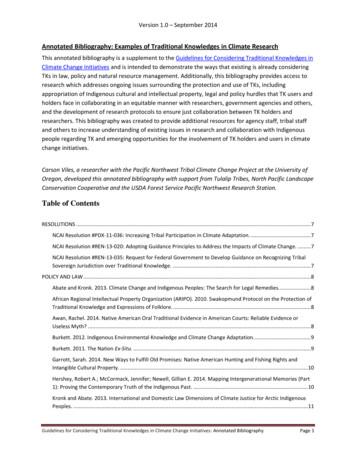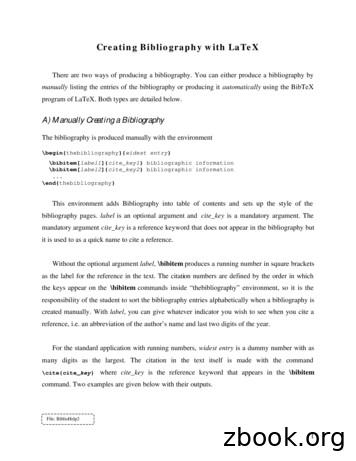Annotated Bibliography: Examples Of Traditional . - Framework
Version 1.0 – September 2014Annotated Bibliography: Examples of Traditional Knowledges in Climate ResearchThis annotated bibliography is a supplement to the Guidelines for Considering Traditional Knowledges inClimate Change Initiatives and is intended to demonstrate the ways that existing is already consideringTKs in law, policy and natural resource management. Additionally, this bibliography provides access toresearch which addresses ongoing issues surrounding the protection and use of TKs, includingappropriation of Indigenous cultural and intellectual property, legal and policy hurdles that TK users andholders face in collaborating in an equitable manner with researchers, government agencies and others,and the development of research protocols to ensure just collaboration between TK holders andresearchers. This bibliography was created to provide additional resources for agency staff, tribal staffand others to increase understanding of existing issues in research and collaboration with Indigenouspeople regarding TK and emerging opportunities for the involvement of TK holders and users in climatechange initiatives.Carson Viles, a researcher with the Pacific Northwest Tribal Climate Change Project at the University ofOregon, developed this annotated bibliography with support from Tulalip Tribes, North Pacific LandscapeConservation Cooperative and the USDA Forest Service Pacific Northwest Research Station.Table of ContentsRESOLUTIONS .7NCAI Resolution #PDX-11-036: Increasing Tribal Participation in Climate Adaptation. .7NCAI Resolution #REN-13-020: Adopting Guidance Principles to Address the Impacts of Climate Change. .7NCAI Resolution #REN-13-035: Request for Federal Government to Develop Guidance on Recognizing TribalSovereign Jurisdiction over Traditional Knowledge. .7POLICY AND LAW .8Abate and Kronk. 2013. Climate Change and Indigenous Peoples: The Search for Legal Remedies.8African Regional Intellectual Property Organization (ARIPO). 2010. Swakopmund Protocol on the Protection ofTraditional Knowledge and Expressions of Folklore. .8Awan, Rachel. 2014. Native American Oral Traditional Evidence in American Courts: Reliable Evidence orUseless Myth? .8Burkett. 2012. Indigenous Environmental Knowledge and Climate Change Adaptation. .9Burkett. 2011. The Nation Ex-Situ. .9Garrott, Sarah. 2014. New Ways to Fulfill Old Promises: Native American Hunting and Fishing Rights andIntangible Cultural Property. .10Hershey, Robert A.; McCormack, Jennifer; Newell, Gillian E. 2014. Mapping Intergenerational Memories (Part1): Proving the Contemporary Truth of the Indigenous Past. .10Kronk and Abate. 2013. International and Domestic Law Dimensions of Climate Justice for Arctic IndigenousPeoples. .11Guidelines for Considering Traditional Knowledges in Climate Change Initiatives: Annotated BibliographyPage 1
Version 1.0 – September 2014Maldonado, Julie Koppel; Christine Shearer, Robin Bronen, Kristina Peterson, and Heather Lazrus. 2013. TheImpact of Climate Change on Tribal Communities in the US: Displacement, Relocation, and Human Rights. .11Rodriguez-Uribe, Natalia. 2014. Collective Legal Autonomy Concerning Traditional Ecological Knowledge: TheRights of Indigenous Peoples and Their Linkages to Biodiversity Conservation in Colombia and Australia. .12Tulalip Tribes. Intangible Cultural Heritage Protection Act. .12UN Human Rights Committee. Concluding observations on the fourth report of the United States of America.13Williams, Terry and Hardison, Preston. 2013. Policy Maker White Paper on Traditional Knowledge Governance.13Wolfley, Jeanette. 2014. Tribal Environmental Programs: Providing Fair and Meaningful Involvement.14PROTOCOLS .15Akwesasne Task Force on the Environment. 1996. Protocol for Review of Environmental and ScientificResearch Proposals. .15Alberta Mental Health Board. 2006. Aboriginal Research Protocols: Healthy Aboriginal People in HealthyCommunities. .15American Indian Law Center. 1999. Model Tribal Research Code. .16Australian Institute of Aboriginal and Torres Strait Islander Studies (AIATSIS). 2012. Guidelines for EthicalResearch in Australian Indigenous Studies. .16Boles et al. 2008. Report: Taskforce to Review Protocols for Native American Archival Materials. .17Canadian International Development Agency (CIDA). n.d. Handbook of CIDA Project Planning and IndigenousTraditional Knowledge. .17Canadian International Development Agency. n.d. General Guidelines. .18Carjuzaa et al. 2010. The Give Away Spirit: Reaching a shared vision of ethical indigenous researchrelationships. .19Cochran, Patricia Longley. n.d. Alaska Native Science Commission Research Ethics Sample MOA. .19Cochran, Patricia Longley. n.d. Ethical Guidelines for use of Traditional Knowledge in Research & Science. .20Colchester et al. 2007. Making FPIC—Free, Prior and Informed Consent—Work: Challenges and Prospects forIndigenous People. .20Convention on Biological Diversity. 2011. Tkarihwaié:ri: Code of Ethical Conduct to Ensure Respect for Culturaland Intellectual Heritage of Indigenous and Local Communities. .21Dena Kayeh Institute. 2010. Traditional Knowledge Protocol. .21First Archivist Circle. 2007. Protocols for Native American Archival Materials. .21First Nations Centre. 2007. Considerations and Templates for Ethical Research .22Practices. .22First Nations Centre. 2005. Ownership, Control, Access, and Possession (OCAP) or Self-Determination Appliedto Research. .23Fish and Wildlife Service. 2013. Traditional Ecological Knowledge - Basic FWS Information. .23Guidelines for Considering Traditional Knowledges in Climate Change Initiatives: Annotated BibliographyPage 2
Version 1.0 – September 2014Gwich’in Social & Cultural Institute. 2004. Traditional Knowledge Policy. .24Holcombe, Sarah et al. 2009. Indigenous Ecological Knowledge and Natural Resources in the NorthernTerritory: Guidelines for Indigenous Ecological Knowledge Management (including archiving and repatriation).25Houde, Nicholas. 2007. The six faces of traditional ecological knowledge: Challenges and opportunities forCanadian co-management arrangements. .25Inuit Tapiriit Kanatami and Nunavut Research Institute. 2007. Negotiating Research Relationships with InuitCommunities: A Guide for Researchers. .26IPBES Proposed Procedures for Working with ILK. .26Mason et al. 2012. Listening and learning from traditional knowledge and Western science: a dialogue oncontemporary challenges of forest health and wildfire. .27McKenzie Valley Review Board. 2005. Guidelines for Incorporating Traditional Knowledge in EnvironmentalImpact Assessment. .28Management of Social transformations Programme (MOST) and Centre for International Research andAdvisory Networks (CIRAN). 2002. Best Practices on Indigenous Knowledge. .28Mi'kmaw Ethics Watch. 1999. Research Principles and Protocols. .28Nakata, NM, V Nakata, A Byrne, J McKeough, G Gardiner, and J Gibson. 2008. Australian Indigenous DigitalConnections: First Generation Issues. .29NCAI Policy Research Center and MSU Center for Native Health Partnerships. 2012. Walk softly and listencarefully: Building research relationships with tribal communities. .29Nuu-chah-nulth Tribal Council Research Ethics Committee. 2008. Protocols & Principles.30for Conducting Research in a Nuu-Chah-Nulth Context. .30O’Neal, Jennifer. n.d. Respect, Recognition and Reciprocity: The Protocols for Native American ArchivalMaterials.30Secretariat of the Convention on Biological Diversity. 2004. Akwé: Kon Voluntary Guidelines for the Conduct ofCultural, Environmental and Social Impact Assessment regarding Developments Proposed to Take Place on, orwhich are Likely to Impact on, Sacred Sites and on Lands and Waters Traditionally Occupied or Used byIndigenous and Local Communities. .31Substance Abuse and Mental Health Services Administration (SAMHSA). 2009. Culture Card: A Guide To BuildCultural Awareness—American Indians and Alaska Natives. .31Thaman, R., Lyver, P., Mpande, R., Perez, E., Carino, J. and Takeuchi, K. (eds.) 2013. The Contribution ofIndigenous and Local Knowledge Systems to IPBES: Building Synergies with Science.32Traditional Knowledge Governance Project. 2013. Preliminary Interim Guidelines on Traditional Knowledge. .33United Nations. 2013. Best practices and available tools for the use of indigenous and traditional knowledgeand practices for adaptation, and the application of gender-sensitive approaches and tools for understandingand assessing impacts, vulnerability and adaptation to climate change. .33UN Framework Convention on Climate Change (FCCC). 2014. Report on the meeting on available tools for theuse of indigenous and traditional knowledge and practices for adaptation, needs of local and indigenouscommunities and the application of gender-sensitive approaches and tools for adaptation. .34Guidelines for Considering Traditional Knowledges in Climate Change Initiatives: Annotated BibliographyPage 3
Version 1.0 – September 2014Wild, Robert and Christopher McLeod (eds). 2008. Sacred Natural Sites: Guidelines for Protected AreaManagers. .35CASE STUDIES .35Anaya, S James, Report by the UN Special Rapporteur on the situation of human rights and .35fundamental freedoms of Indigenous People: Addendum, The Situation of Indigenous Peoples in Australia. .35Drought in the Four Corners Region. .36Emery, Marla R.; Wrobel, Alexandra; Hansen, Mark H.; Dockry, Michael; Moser, W. Keith; Stark, Kekek Jason;Gilbert, Jonathan H. 2014. Using traditional ecological knowledge as a basis for targeted forest inventory:paper birch (Betula papyrifera) in the US Great Lakes Region. .36Gautam, Mahesh, Karletta Chief, and William Smith. 2013. Climate Change in Arid Lands and Native AmericanSocioeconomic Vulnerability: the Case of the Pyramid Lake Paiute Tribe. .37Indigenous Observations of Climate Change in the Lower Yukon River Basin, Alaska. .38Spoon, Jeremy; Arnold, Richard. 2012. Collaborative research and co-learning: Integrating Nuwuvi (SouthernPaiute) ecological knowledge and spirituality to revitalize a fragmented land.38Tooker, Lisa; Ka’ai’ai, Charles; Spalding, Sylvia and Simonds, Kitty. 2008. HO‘O ANO ANONAK P NAPAL . .39INTELLECTUAL PROPERTY .39Alexander, Merle, K Chamundeeswari, Alphonse Kambu, Manuel Ruiz, Brendan Tobin. 2004. The Role ofRegisters and Databases in the Protection of Traditional Knowledge: a Comparative Analysis. .39Bannister and Hardison. 2006. Mobilizing Traditional Knowledge and Expertise for Decision-Making onBiodiversity. .40Hansen and Van Fleet. 2003. Traditional Knowledge and Intellectual Property. .41Hardison and Bannister. 2011. Ethics in Ethnobiology. .41Hill et al. 2010. Guide to Free Prior and Informed Consent. .42Janke, Terri. 2009. Writing up Indigenous Research: Authorship, Copyright and Indigenous Knowledge Systems.42Laughlin, Jennifer. UN REDD Programme. 2013. Guidelines on Free, Prior and Informed Consent. .43Talakai, Malia. 2007. Intellectual Property and Safeguarding Cultural Heritage: A Survey of Practices andProtocols in the South Pacific. .43Tamang, Parshuram. 2005. An Overview of the Principle of Free, Prior and Informed Consent and IndigenousPeoples in International and Domestic Law and Practices. .44Taniguchi et al. 2012. A comparative analysis of indigenous research guidelines to inform genomic research inindigenous communities. .44Williams and Hardison. 2013. Culture, Law, Risk and Governance: Contexts of Traditional Knowledge in ClimateChange Adaptation. .45TRADITIONAL KNOWLEDGES AND CLIMATE CHANGE .45Baldy, Cutcha Risling. 2013. Why we gather: traditional gathering in native Northwest California and the futureof bio-cultural sovereignty. .45Guidelines for Considering Traditional Knowledges in Climate Change Initiatives: Annotated BibliographyPage 4
Version 1.0 – September 2014Bohensky, Erin L., and Maru, Yiheyis. 2011. Indigenous knowledge, science, and resilience: what have welearned from a decade of international literature on “integration”? .46Cochran, Patricia; Huntington, Orville; Pungowiyi; Caleb, Tom, Stanley; Chapin III, F Stuart; Huntington, Henry;Maynard, Nancy; Trainor, Sarah. 2013. Indigenous frameworks for observing and responding to climatechange in Alaska. .46Doyle, John; Redsteer, Margaret; Eggers, Margaret. 2013. Exploring Effects of Climate Change on NorthernPlains American Indian Health.47Lake, Frank. 2007. Traditional ecological knowledge to develop and maintain fire regimes in NW California,Klamath-Siskiyou bioregion: management and restoration of culturally significant habitats. .47Lynn, Kathy, John Daigle, Jennie Hoffman, Frank Lake, Natalie Michelle, Darren Ranco, Carson Viles, GarritVoggesser, and Paul Williams. 2013. The Impacts of Climate Change on Tribal Traditional Foods. .48McGregor. 2005. Traditional Ecological Knowledge: An Anishnabe Woman's Perspective. .48McLean, Galloway Kirsty; Ramos-Castillo, Ameyali; Rubis, Jennifer (Eds). 2011. Indigenous Peoples,Marginalized Populations and Climate Change: Vulnerability, Adaptation and Traditional Knowledge. .49Mercer et al. 2010. Framework for integrating indigenous and scientific knowledge for disaster risk reduction.49Nakashima et al. 2012. Weathering Uncertainty: Traditional Knowledge for Climate Change Assessment andAdaptation. .50Shackeroff, Janna M. and Campbell, Lisa M. 2007. Traditional Ecological Knowledge in Conservation Research:Problems and Prospects for their Constructive Engagement. .51Stark, Heidi Kiiwetinepinesiik. 2010. Respect, Responsibility and Renewal: The Foundations of AnishnaabeTreaty Making with the United States and Canada. .51Swinomish Indian Tribal Climate Change Initiative. .52Tengö, M., Malmer, P., Brondizio, E., Elmqvist, T. & Spierenburg, M. 2013. The Multiple Evidence Base as aFramework for Connecting Diverse Knowledge Systems in the IPBESPDF. .52Tengö, Maria; Brondizio, Eduardo S.; Elmqvist, Thomas; Malmer, Pernilla; Spierenburg, Marja. 2014.Connecting Diverse Knowledge Systems for Enhanced Ecosystem Governance: The Multiple Evidence BaseApproach. .53Turner and Clifton. 2009: “It’s so different today”: Climate change and indigenous lifeways in British Columbia,Canada. .53Vinyeta and Lynn. 2013. Exploring the Role of Traditional Ecological Knowledge in Climate Change Initiatives.54Voggesser, Garrit; Kathy Lynn, John Daigle, Frank Lake, and Darren Ranco. 2013. Cultural Impacts to Tribesfrom Climate Change Influences on Forests. .54Whyte, Kyle. 2014. Indigenous Women, Climate Change and Collective Action. .55Wildcat, Daniel. 2013. Introduction: Climate Change and Indigenous Peoples of the USA. .55ETHICS AND TRADITIONAL KNOWLEDGE .55Battiste, Marie. 2005. Indigenous Knowledge: Foundations for First Nations. .55Guidelines for Considering Traditional Knowledges in Climate Change Initiatives: Annotated BibliographyPage 5
Version 1.0 – September 2014Mayer, R. 2007. What's wrong with exploitation? .56Meyers, C. D. 2004. Wrongful beneficence: Exploitation and third world sweatshops. .56Reo, Nicholas, and Angela Parker. 2013. Re-thinking colonialism to prepare for the impacts of rapidenvironmental change. .56Stories of Conflict: Genetic Science and Traditional Origins. .57Tropser, Ronald L. and Parrotta, John A. (eds). 2012. Traditional Forest-Related Knowledge: SustainingCommunities, Ecosystems and Biocultural Diversity. .57Wertheimer, A. 1996. Exploitation. .58Whyte. 2013. On the role of traditional ecological knowledge as a collaborative concept: a philosophical study.58Whyte, Kyle Powys. 2013. Justice Forward: Tribes, Climate Adaptation and Responsibility. .59CLIMATE SCIENCE AND IMPACTS.59Cozzetto et al. 2013. Climate Change Impacts on the Water Resources of American Indians and Alaska Nativesin the U.S. .59Dittmer, Kyle. 2013. Changing Streamflow on Columbia Basin Tribal Lands-Climate Change and Salmon. .60Grah and Beaulieu. 2013. The Effect of Climate Change on Glacier Ablation and Baseflow Support in theNooksack River Basin and Implications on Pacific Salmonid Species Protection and Recovery. .60Grossman and Parker. 2012. Asserting Native Resilience: Pacific Rim Indigenous Nations Face the ClimateCrisis. .61IPCC. 2012: Managing the Risks of Extreme Events and Disasters to Advance Climate Change Adaptation. ASpecial Report of Working Groups I and II of the Intergovernmental Panel on Climate Change. .61Guidelines for Considering Traditional Knowledges in Climate Change Initiatives: Annotated BibliographyPage 6
Version 1.0 – September 2014RESOLUTIONSNCAI Resolution #PDX-11-036: Increasing Tribal Participation in Climate Adaptation.Many inter-tribal organizations have taken a strong stance in favor of increased tribal participation in USgovernment climate adaptation efforts. For example, the National Congress of American Indians (NCAI)created a Resolution entitled “Traditional Ecological Knowledge and Climate Change.” In this resolution,the NCAI notes that given the relationship between the federal government and Tribes, the uniquethreats that climate change poses to Native people, and the value of TEKs held within Nativecommunities, Tribes have a right to be involved in federal climate adaptation planning at all stages. TheNCAI urges for the “inclu[sion] of Tribes in all climate change policies, programs and activities from thevery start ,” while also noting that it is essential that with increased collaboration comes greatersafeguards for Tribal knowledge and increased respect in partnerships. The NCAI notes in theirresolution that this issue is especially pertinent given the emphasis of the current administration tosupport Tribes as they adapt to climate impacts.NCAI Resolution #PDX-11-036. 2011. Increasing tribal Participation in Climate Adaptation.Type of Publication: PolicyKeywords: traditional knowledge, federal climate adaptation, trust responsibilityNCAI Resolution #REN-13-020: Adopting Guidance Principles to Address the Impacts ofClimate Change.This resolution describes the efforts of the NCAI to evaluate the effectiveness of the Executive Order13175, and Secretarial Order 3289. The NCAI lays out a plan to collaborate with the Affiliated Tribes ofNorthwest Indians (ATNI) in order to do so. Furthermore, the NCAI describes plans to create a TribalClimate Change Task Force, made up of tribal government representatives and others, in order to createand implement a plan of action regarding climate change.NCAI Resolution #REN-13-020. 2013. Adopting Guidance Principles to Address the Impacts of ClimateChange.Type of Publication: ResolutionKeywords: climate adaptation planning, policy assessmentNCAI Resolution #REN-13-035: Request for Federal Government to Develop Guidance onRecognizing Tribal Sovereign Jurisdiction over Traditional Knowledge.In this resolution, the NCAI describes traditional knowledges (TKs) and the inadequacy of current federalpolicies and practices with regards to the protection of TKs. The NCAI calls for the federal government towork with tribes to create gain a better understanding in federal agencies about TKs and that federalagencies reform their policies to reflect more respectful and appropriate practices regarding TKs.NCAI Resolution #REN 13 035. 2013. Request for Federal Government to Develop Guidance onRecognizing Tribal Sovereign Jurisdiction over Traditional Knowledge.Type of Publication: ResolutionGuidelines for Considering Traditional Knowledges in Climate Change Initiatives: Annotated BibliographyPage 7
Version 1.0 – September 2014Keywords: traditional knowledges (TKs), federal policyPOLICY AND LAWAbate
This annotated bibliography is a supplement to the Guidelines for Considering Traditional Knowledges in Climate Change Initiatives and is intended to demonstrate the ways that existing is already considering TKs in law, policy and natural resource management. Additionally, this bibliography provides access to
Part - I Short Bibliography 1-33 Part I contains the short (not annotated) references of this bibliography, alphabetically sorted by author. Subject to availability, we provide hyperlinks/website addresses for each item. As of January 5, 2010, this bibliography contains 406 items. Part - II Annotated Bibliography 34-203
Setting up your NHD Annotated Bibliography Create a word document just for your annotated bibliography. See the examples for how to format the bibliography. Your full name Use Arial, Times, or any easily read font. Do
annotated storyboard for TV ads, annotated patient brochure) o1.15.2.1.3 Annotated labeling version: Annotated approved product labeling (PI, PPI, Medication Guide) o1.15.2.1.4 Annotated references: Annotated references for
An Annotated Bibliography Prepared by Pastor Marty Baker July 2014 Before you start perusing my annotated bibliography, permit me to first share a couple of things . The list does not contain the other 5,000 biblical books I possess and read with my Logos Bible software. By the way, this is
6 Bibliography Style A bibliography style has to be chosen. The bibliography style can be declared with \bibliography{style} command, which may be issued anywhere after the preamble.The style is a file with .bst extension that determines how bibliography entries will appear at the output, such a
An Annotated Bibliography of Published Materials on Puerto Ricans Compiled and Annotated by Marisa Rivera Iowa State University W orking Paper No. 30 June 1997 About the Author: Marisa Rivera Ms. Rivera is a doctoral candidate in Youth and Huma
western dialogue editorial eulogy autobiography speech tabloid article romance photograph internship/fellowship application . an introduction to a main character . Cartoon: The Capture Epilogue Bibliography Back to title page . Annotated Bibliography What is an annotated bibliography? An annotation is a brief description of the source. You are
The Certificate in Russian Language is six- month programme of 16 Credits. The programme aims at providing beginners with basics of Russian Language. The objective of the programme is to introduce learners to the basics of Russian grammar and phonetics so that they can read, write, listen and speak Russian in an accurate manner. The programme is bilingual (Russian/English) in medium and has .























